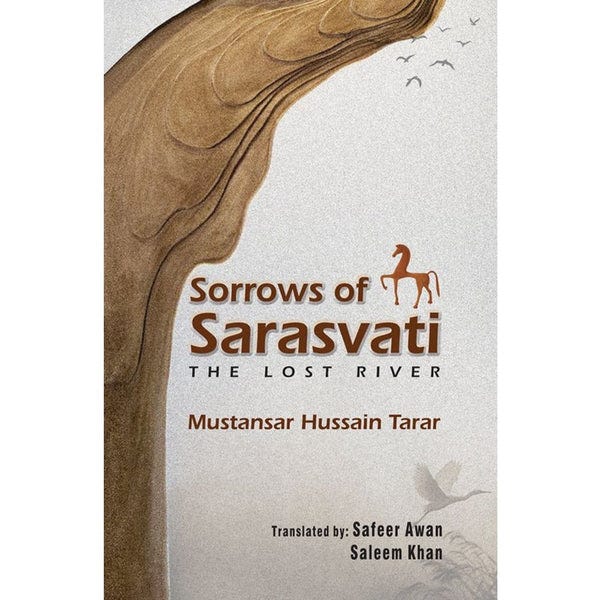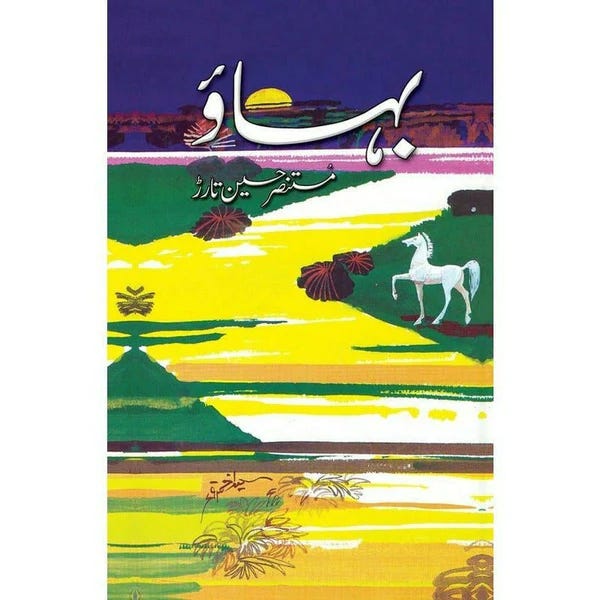The Thousand Paths of Tarar: A Conversation with a Master of Urdu Literature
Focus on his novel "The Sorrows of Sarasvati", (Bahaao), about the Indus Valley Civilization
Podcast interview with Mustansar Hussain Tarar
Mustansar Hussain Tarar in 1960 - Official Facebook Page - https://tinyurl.com/2hrznxre
To engage in dialogue with a cultural icon like Mustansar Hussain Tarar is a rare privilege. This legendary Pakistani author, mountaineer, journalist, and television personality is a revered figure, whose pen has immortalized the untamed beauty of the northern peaks, while his inspired prose has compelled entire generations to explore their rich heritage.
Born in 1939 in Gujrat and raised in Lahore, Tarar received an excellent education at Government College Lahore and even in London, laying the foundation for a prolific literary career. With over 50 novels, short story collections, and more than 40 travelogues to his name, he is widely regarded as one of the greatest contributors to Urdu travel literature in Pakistan.
Among his most celebrated works is "Bahaao" (titled "The Sorrows of Sarasvati" in English), an epic narrative that resurrects the ancient Indus Valley Civilization.
Tarar has been bestowed the highest honours in his homeland, such as the prestigious Sitara-i-Imtiaz in 2017 and the Pride of Performance Award in 1992 for his extraordinary literary contributions.
Buy the Book on Sangemeel.shop
The Podcast Interview
In the course of a stimulating interview, I posed questions to Tarar about the themes of his novel "The Sorrows of Sarasvati." With grace and wisdom, he shared illuminating perspectives that resonated in the deepest recesses of my mind.
The literary masterpiece The Sorrows of Sarasvati holds profound relevance for those captivated by the realms of imaginative storytelling, humanity's storied past, the study of ancient civilizations, the analysis of societal evolution, or the examination of language's intricate tapestry. Indeed, the vast array of existential inquiries tackled within its pages transcends cultural boundaries, resonating with the fundamental contemplations that permeate the shared human experience across the globe.
This tour de force deserves widespread dissemination beyond its origins, warranting publication and circulation throughout the world's diverse cultural landscapes. Doing so would cement its status as a vital, enduring contribution to the canon of great world literature.
Non-duality
The non-dual thought of Vedanta philosophy permeates The Sorrows of Sarasvati Tarar explained that the characters are constantly grappling with inquiries into their very existence, a theme that evokes the deconstruction of the separate self characteristic of non-dual thought.
But it was in evoking the image of the peacock, whose cadenced calls punctuate the book's pages, that Tarar revealed an enlightening insight. As a death messenger, the peacock call seems an invitation to awaken to the underlying cosmic unity. Tarar admitted that many of his writings were heavily influenced by the mystic masterpiece "The Conference of the Birds" by Farid ud-Din Attar.
Another fascinating aspect I explored was the intersection between magical realism and Vedanta philosophy in "The Sorrows of Sarasvati," with its talking animals and spiritually aware plants. Tarar described magical realism as an ideal vehicle for expressing non-dual truths, blending the ordinary with the incredible in a space of suspended credulity.
Buy the Book on Sangemeel.shop
Besides, even before magical realism emerged as a literary genre, Tarar always aspired to imbue the animal, plant, and mineral realms with a "voice" throughout his compositions. In the esteemed Pakistani author's view, while literature fundamentally serves humankind, it possesses immense capacity to vastly broaden its perspectives.
Listening
Listening to Tarar weave profound philosophical concepts with poetic imagery, I was in awe of his ability to make such elevated truths accessible with genuine humility.
By the end, I was filled with gratitude for having drawn from this wellspring of wisdom. Tarar's responses shed light on the mysteries of existence while celebrating the beauty of the written word when wielded by an enlightened mind.
To dialogue with a luminary of his calibre was a balm for the soul, a reminder of how literature and philosophy can serve as beacons guiding us to transcend illusions and embrace the unity underlying the multiplicity of forms.
Like a mystic, Tarar reminds us that the search for transcendence requires no outward journey, for the ultimate goal resides peacefully in the heart of the present moment, awaiting only our openness to receive it. His voice is that of an elder sage seated by a mountain stream, whose ceaseless melody sings: "Relinquish the illusions of the separating ego, and you shall behold the Face of the One in the infinite dance of the manifest universe."
I think I have given you enough of a preview. All that's left is for you to listen to the podcast, and I hope it inspires you as much as it did me. Enjoy!
I have woven tales to share, for any who care to read them. My books await you on Google Books. Check also my stories on Medium.com.
I would be honoured if you considered subscribing to the Premium Contents of my Vedanta Substack and leaving feedback, comments, and suggestions both on this page and by writing to me at cosmicdancerpodcast@gmail.com.
Thank you for reading and listening.
Feel free to leave a comment.
I have woven tales for anyone who cares to read them. My books await you on Google Books.
Feel free to contact me.
I would be honoured if you considered subscribing to the Premium Contents of my Vedanta Substack and leaving feedback, comments, and suggestions on this page and by writing to me at cosmicdancerpodcast@gmail.com.
Visit my BuyMeACoffee page.
Thanks for reading.






